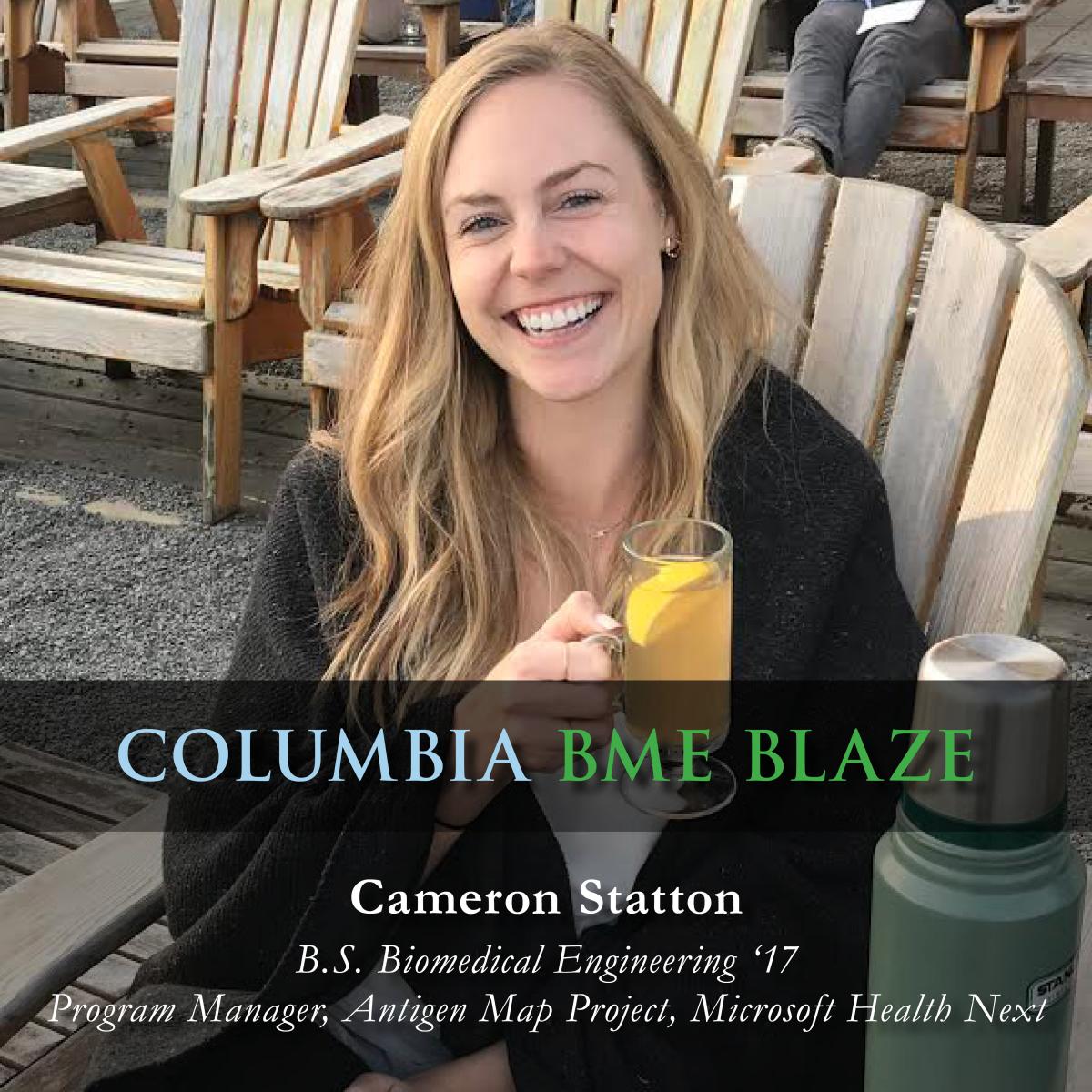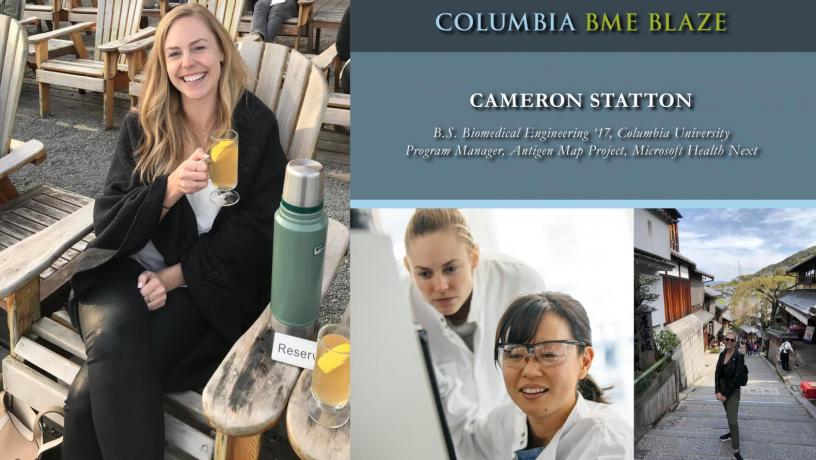September 2020 - BME Blaze: Cameron Statton
In this monthly spotlight, get to know the alumni, students, and faculty of Columbia's Department of Biomedical Engineering. Read what our BME folks are up to, from our faculty's latest research, to our students' plans for the future, to our teams' innovations, start-ups and other career successes.

We had a chance to sit down with Columbia BME alumna, Cameron Statton (B.S. '17), to chat about her experience in the Columbia 3/2 Engineering Combined Plan Program, her role at Microsoft, and her advice to future BME students.
Read Cameron's story below!
Where are you from?
I am from Oakland, California and I currently live in Seattle, Washington.
What drew you to the field of Biomedical Engineering?
I knew I wanted to be an engineer since I was young. I loved the idea of building things and creating something new for the world to use. When I was in high school I realized that just building “things” wouldn’t make the impact I wanted to have on the world, which led me in the direction of something health-related. Biomedical Engineering is such a broad field, allowing you to learn and specialize in many different areas from biomechanics to tissue engineering to biostatistics, and many more. Ultimately, I wanted the ability to have exposure to all these different areas that fell under the “Biomedical Engineering” umbrella.
What is your current role?
I am the Program Manager for the Antigen Map Project within Microsoft Health Next. My responsibilities include managing workstreams spanning from software to modeling to computational biology. I also lead a number of strategy, market, and user research efforts and own the program management workflow from timelines to deliverables.
Why did you choose Columbia BME?
I was a part of the 3/2 Engineering Combined Plan Program, attending Scripps College from 2012-2015 and Columbia University from 2015-2017. I graduated with a BA in Engineering from Scripps College and a BS in Biomedical Engineering from Columbia University. This program provided me the opportunity to get both a liberal arts and engineering education, which has helped me have a more all-encompassing approach to my work and to view problems from other perspectives.
What were some of your favorite projects/memories from the program?
I loved working with my team on our Senior Design Project. It was the first time I was able to experience working on a project from ideation and needs analysis to building and testing to presenting. It was really cool seeing all the different groups come up with amazing biomedical devices and applications. Our team developed a neonatal jaundice diagnostic device for low-income countries. This was a need that was directly observed by one of my teammates on his trip to Uganda, which was an amazing opportunity the BME department provided.
What was your proudest moment at Columbia?
I am definitely proud of our Senior Design Project group for being awarded 2nd place at the 2017 Rice360 Global Health Technologies Design Competition as well as a Stage I Winner of the 2017 VentureWell Competition. Lots of hard work, dedication, and late nights went into that project so it was great to be acknowledged by those competitions.
What are your thoughts on the strength of Columbia BME's alumni network and how has that influenced your career path?
Columbia has such a wide network throughout the entire world. When I was still in school, I found a year-round internship through the BME department, which I kept for over two years. I was able to team up with a group of recent grads that had continued their Senior Design Project for cervical cancer screening and created a start-up called Luso Labs. Opportunities like this always seem to happen through the Columbia BME alumni network.
Any words of wisdom or tips for prospective BME students?
In industry, it is important to be able to communicate with your coworkers who may have different roles, perspectives, and technical backgrounds. The 3/2 Engineering Combined Plan Program allowed me to do this. Even without a program like that, I highly recommend branching out of your typical required classes and taking other things of interest to you to improve your soft skills. To be able to do great things and make an impact, you not only need to have the technical know-how, you need to be able to communicate with your team, key stakeholders, and users.
What are you excited about?
I am extremely excited about the community’s response to COVID-19 and the many different fields and industries using their technology and expertise to help fight this virus. It seems that everywhere I look there are groups racing to help in this effort, and I am especially excited to see lots of the research made public in an effort to expand knowledge. I love being a part of a team working to better understand the human’s response to the virus, the effects on a person’s immune system, and to discover earlier and more accurate diagnostics. I feel lucky and excited to work on a project that can have such a large impact.
I love being a part of a team working to better understand the human’s response to the virus, the effects on a person’s immune system, and to discover earlier and more accurate diagnostics. I feel lucky and excited to work on a project that can have such a large impact.

